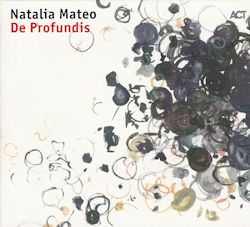 BUY NOW AmazonUK AmazonUS |
NATALIA MATEO
De Profundis
|
Bandoska
Eternity
Elegja Pielgrzyma
I Will Always Love You
Kolysanka Rosemary/Rosemary's Baby
Unsound
Prayer
Eksplozja Paranoja
Dziwny Jest Ten Swiat
François Villon-Modlitwa
Natalia Mateo - Vocal
Sebastian Gille - Saxophone
Simon Grote - Piano
Dany Ahmad - Guitars
Christopher Bolte - E-bass
Felix Barth - Double bass
Fabian Ristau - Drums
There's a saying ' we drink from our own wells' and that is what singer, composer and bandleader Natalia Mateo surely does on this album. Her life experience, culture and distinctive approach come together to make a highly individual recording. Born in Poland in 1983, but raised in Austria and these days regarding Berlin as home, she draws together disparate strands (jazz, Polish folk music and the singer/songwriter ethos) and makes of them a satisfying oeuvre. Her debut album for ACT was Heart Of Darkness, which appeared in 2015. Her choice of material then was more mainstream than on this present disc. She also sings in Polish more frequently this time around. Her fellow musicians on this recording have played together as a regular band over several years, the exception being the German tenor saxophonist Sebastian Gille who joins them here. Born in the same year as Mateo, he has already accumulated an impressive c.v.
My particular favourites on the disc are Eternity and Kolysanka Rosemary/Rosemary's Baby. Mateo has added a line of her own to supplement William Blake's single verse on Eternity and, with Ahmad and Grote, provided the tune. She demonstrates that she can effectively use her voice as an instrument as she scats in the early part of the track. This is a sultry vocal performance too and the group performance is excellent. Kolysanka Rosemary/Rosemary's Baby is Krzysztof Komeda's theme from the Polanski movie of that name. Komeda's film music and compositions are rightly valued in his native Poland. The trumpeter Tomasz Stanko, for instance, has often recorded them. Mateo's rendition of this beautiful melody is superb while Simon Grote impresses on piano. Not far behind for quality is Eksplozja paranoja/Explosion, paranoia. The lyrics are by Mateo and are printed side by side in the liner notes in both Polish and English. I suspect they lose something in translation in that, in English, they seem oblique and cryptic (that may be what's she's aiming at, however). Nevertheless, there's something about the piece which connects in a vital way with the listener. Mateo comes across rather like a torch singer, her voice compelling and impassioned, on Bandoska, a heartfelt lament about the drudgery of work and a longing for the sun to go down. Elegja pielgrzyma/Pilgrim's Elegy has a certain breathlessness about it as she sings, this time, of a failure in love. Even in the desperation she evokes, there's a hint of eroticism. Special mention should be made of the splendid guitar accompaniment provided by Dany Ahmad on this track.
We're on familiar territory with the country singer Dolly Parton's I Will Always Love You, a big hit for Whitney Houston subsequent to Parton's original recording. On this occasion, it takes a full two minutes for the theme to emerge. What we have is a powerful, unusual, idiosyncratic cover of the song. Mateo's singing on Unsound put me in mind of another ACT artiste, Viktoria Tolstoy, never a bad thing. The nimble rhythm section are to be applauded here and creative pianist Grote is at his best. Saxophonist Gille contributes throughout but I especially appreciated his empathetic playing (and the skill of electric bassist Christopher Bolte) on Dziwny jest ten s wiat. Maybe Prayer could be construed as overly theatrical but François Villon-Modlitwa, a further lament delivered with feeling, has a surprise for listeners at the end. This comes in the form of a couple of extra minutes of a vocal chorus sung in German.
The title of the album, De Profundis, means 'out of the depths' in Latin. For Natalia Mateo it is an appropriate title since she is anything but superficial. She sings from the heart, with her strong and versatile voice, and seems completely authentic in her approach. Her choice of material is very personal and, at times, may not suit everyone but her talent is indisputable.
James Poore